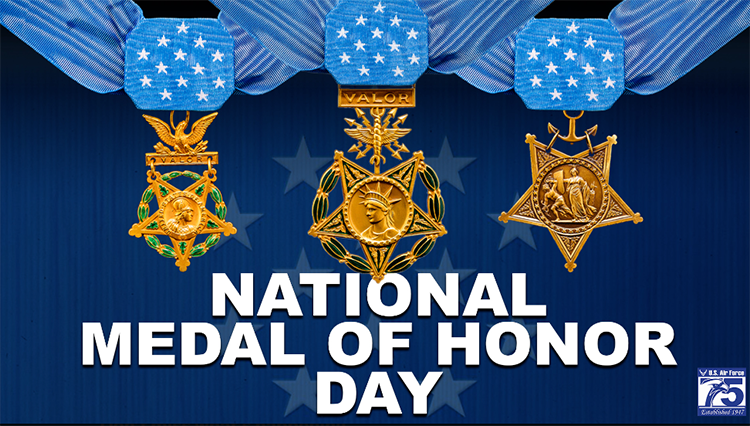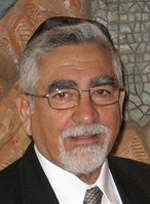
By Dorian de Wind
The Moderate Voice

AUSTIN, Texas — Monday, March 25, is National Medal of Honor Day. A day to solemnly recognize and honor the more than 3,500 Soldiers, Airmen, Sailors and Marines who have distinguished themselves “through conspicuous gallantry and intrepidity at the risk of life above and beyond the call of duty…”
National Medal of Honor Day was established by Congress in 1990 to “foster public appreciation and recognition of Medal of Honor Recipients” and has been celebrated since 1991.
The day, March 25, was selected because March 25, 1863, was the date when the first Medal of Honor was presented. It was awarded to Private Jacob Parrott for “extraordinary heroism in April, 1862, while serving in action with Company G, 21st Ohio Infantry, during the Andrew’s Raid in Georgia,” an event also known as “The Great Locomotive Chase.”
Eighteen service members of the Jewish faith have been awarded the Medal of Honor, going as far back as the Civil War.
The first Jewish recipient of the Medal of Honor was Sergeant-Major Abraham Cohn, who, during the Civil War’s “Battle of the Wilderness, “bravely and coolly carried orders to the advanced line under severe fire” at Petersburg, Virginia, 30 July 1864.
Cohn was one of 9,000 Jews who fought for the Union during the Civil War.
Three more soldiers of the Jewish faith who served during the Civil War were recipients of the Medal: Leopold Karpeles, David Orbansky, and Benjamin Levy.
The latter, Benjamin Levy, a 17-year-old drummer boy, “took the gun of a sick comrade, went into the fight, and when the color bearers were shot down, carried the colors and saved them from capture.”
In battles after the Civil War and before World War I, two more Jewish soldiers would receive the nation’s highest military decoration:
• Simon Suhler (aka Charles Gardner) for bravery during the “Indian Campaign” in 1868.
• U.S. Marine Corps Private Samuel Gross (aka Samuel Marguilies) for military valor during the Haitian Campaign in 1915.
During World War I, four Jewish soldiers were bestowed with the Medal of Honor.
• First Sergeant Sidney G. Gumpertz for conspicuous gallantry and intrepidity in action at Bois-de-Forges, France, when Sgt. Gumpertz, in the face of direct fire from a machine gun nest, jumped into the nest and silenced the gun, capturing nine of the crew.
• First Sergeant Benjamin Kaufman for valor in action in the Argonne Forest, France, where, under fire and after an enemy bullet shattered his right arm, Kaufman “advanced on the enemy, lobbing hand grenades with his left arm. He eventually reached the German position and captured a surviving German soldier.”
• Sergeant William Sawelson, for heroism as he made the ultimate sacrifice at Grand-Pré, France.
• Sergeant William Shemin, son of Russian Jewish immigrants, distinguished himself by extraordinary acts of heroism at the risk of his life above and beyond the call of duty on the shores of the Vesle River, near Bazoches, France. Seriously wounded, he survived.
Three Jewish soldiers would be awarded the Medal of Honor for heroism during World War II – all three posthumously:
• Staff Sergeant Jachman suffered fatal wounds while displaying “conspicuous gallantry and intrepidity above and beyond the call of duty” during the Battle of the Bulge at Flamierge, Belgium on 4 January 1945. Jachman was 22. He was born in Berlin around the same time when the Nazi Party led by Adolf Hitler was beginning to flex its muscle. When he was 2, his parents emigrated to the U.S.
• Captain Ben L. Salomon. While serving at Saipan, in the Marianas Islands on July 7, 1944, as surgeon for his battalion, Salomon displayed “extraordinary heroism and devotion to duty” defending his wounded soldiers against an overwhelming attacking force. “When his body was later found, 98 dead enemy soldiers were piled in front of his position.”
• 2d Lt. Raymond Zussman. On September 12, 2944, while in command of two tanks in the town of Noroy-le-Bourg, France, he displayed “heroic and inspiring leadership” for which he would posthumously receive the Medal of Honor as, only nine days later, he was killed in action by a German mortar bomb.
Two Jewish heroes were awarded the Medal of Honor for heroism during the Korean War:
• Private First Class Leonard M. Kravitz for “extraordinary heroism and selflessness at the cost of his own life” while serving as an assistant machine gunner during combat operations against an armed enemy in Yangpyeong, Korea on March 6 and 7, 1951.
• Corporal Tibor Rubin for “for extraordinary heroism during the period from July 23, 1950 to April 20, 1953,” while serving as a rifleman in Korea where, among other, he “single-handedly defended a hill for 24 hours against waves of North Korean soldiers, securing a crucial route of retreat for his rifle company.” Also, for “unyielding courage and bravery” while a prisoner of war for 30 months in a Chinese prisoner of war camp after he was severely wounded. Ruben is the only Holocaust survivor to be awarded the Medal of Honor. When he was thirteen, he survived 14 months at the Nazi Mauthausen concentration camp in Austria.
The Vietnam War saw two more Jewish service members meriting the Medal of Honor:
• 1st Lt. Jack H. Jacobs for “conspicuous gallantry and intrepidity in action at the risk of his life above and beyond the call of duty” during a fierce battle in Kien-Phong, Vietnam. Now a retired Army colonel, Jacobs is a well-known military analyst for NBC News and MSNBC.
• Airman First Class John Levitow for “for conspicuous gallantry and intrepidity in action at the risk of his life above and beyond the call of duty” aboard an AC-47 aircraft flying a night mission in support of Long Binh Army Post, Vietnam.
The most recent servicemember of the Jewish faith awarded the Medal of Honor is Sergeant First Class Christopher A. Celiz. Sgt. Celiz distinguished himself by conspicuous gallantry above and beyond the call of duty while engaged with the enemy in Paktia Province, Afghanistan, on July 12, 2018. His actions to protect his team and defeat the enemy “ultimately cost him his life.”
To say that the Medal of Honor “does not come easy,” would be a massive understatement. In the case of some Jewish recipients of the Medal, even more so.
Even as Jewish men and women – more than 600,000 – have faithfully and patriotically served in every branch of our armed forces since the American Revolution, they have had to struggle against prejudice, constitutional bias and antisemitism and many have been denied high military honors.
Take Holocaust survivor and Korean War hero Tibor Rubin. A 1993 study commissioned by the Army determined that Rubin had been denied the Medal of Honor because of religion. Fifty-five years after Rubin’s heroic actions, President George W. Bush presented Rubin the Medal of Honor.
More than 63 years after his acts of valor, thanks to the Leonard Kravitz Jewish War Veterans Act, President Barack Obama presented the long overdue Medal of Honor to Korean War hero Leonard M. Kravitz.
It took nearly a century for World War I hero William Shemin to receive his Medal of Honor, thanks to the efforts of U.S. Rep. Blaine Luetkemeyer and others. On June2, 2015, President Barack Obama presented the Medal of Honor posthumously to Shemin’s daughters Elsie Shemin-Roth and Ina Judith Bass.
Reflecting on the historic injustice, President Obama said, “Sergeant Shemin served at a time when the contributions and heroism of Jewish Americans in uniform were too often overlooked…It is my privilege on behalf of the American people to make this right.”
While the Congressional Medal of Honor Society identifies eighteen Jewish recipients of the Medal of Honor, veteran author Michael Lee Manning, in his book, Jewish Medal of Honor Recipients: American Heroes, identifies “11 more who are thought to be Jewish but whose ethnicity has not been fully verified…”
*
Dorian de Wind, a retired Air Force officer, is the military affairs correspondent for The Moderate Voice, with which San Diego Jewish World trades stories under auspices of the San Diego Online News Association.
Benjamin Levy was the first Jew to have engaged in heroic action, April-1862, that would be cited for a later presentation of the Congressional Medal of Honor.
https://www.hmdb.org/m.asp?m=231611
When the Jewish American Society, the sponsor of the marker, proposed the text that Levy was first, the Va. Dept. of Historic Resources declined to according recognize Levy. The compromise for the text was to say Levy was one of the first Jewish Americans to have received the CMOH.
Many Jews declined to be identified as Jews in the Union Army during the Civil War. Antisemitism was such that Jews knew and feared, if they were wounded, the medical evacuation teams would retrieve them last.
Delays to receive or deny Jews the CMOH because of antisemitism have plagued the process through contemporary times.